Coop Scoop
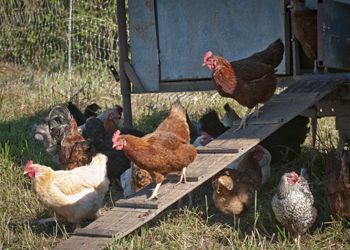
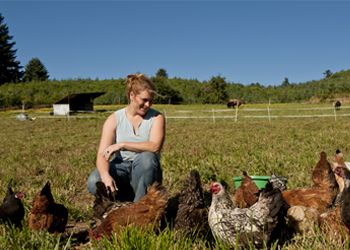
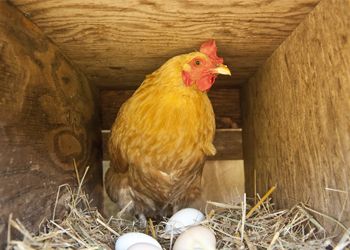
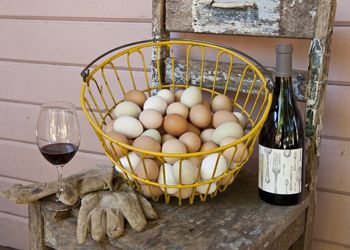
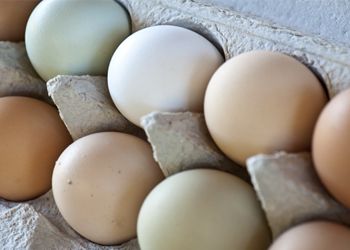
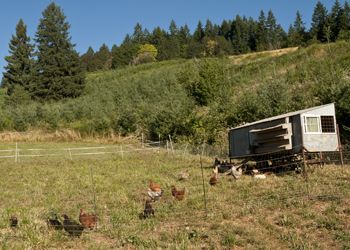
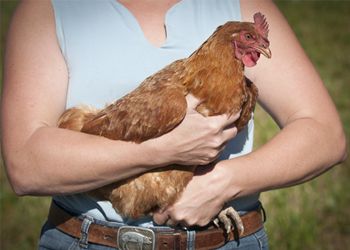
by Kerry Newberry/Photography by Andrea Johnson
The most sublime Pinot Noir to grace your glass may be one of the hottest topics of conversation at the International Pinot Noir Celebration held every July since 1987 in McMinnville. But also swirling around the Riedels this year were the cast of characters at one wine country luncheon that had guests all aflutter.
Brian Marcy and Clare Carver of Big Table Farm hosted attendees for a noontime affair that began with a blending seminar set in a charming barn, hay bales stacked high. Orchestrated clucks chattered from the nearby hen house. As if on cue, a gregarious rooster would cock-a-doodle-doo. One free ranging chicken burrowing in the towering hay, tail feathers out, provided a photogenic distraction as many wine lovers aimed digital devices at the iconic farm animal hoping to capture this slice of Americana.
The lunch was a sign of the times — wherein chickens are becoming the new rock stars. Over the past few years, the nation has seen a resurgence of backyard chicken keeping. Feathered flocks have been making national headlines with features in The New York Times, The Washington Post and Martha Stewart Living magazine. Stewart calls them “good for the soul and good for the stomach.” A 2009 article in The New Yorker deemed the fowl “The It Bird,” celebrating the return of the backyard chicken.
“Last year with the economy shift, I think people really liked that sense of independence of growing their own food,” said Michelle Koppe, the resident chicken aficionado at Pistils Nursery on Mississippi Ave. in North Portland. “When you go out to your own yard and pick your own eggs, there’s just something really satisfying about that.”
Pistils Nursery is the hot spot in Portland for city chicks. The nursery was ahead of the hen craze when they began selling baby birds eight years ago. Koppe noticed chick sales really peaked last year with new birds selling out in just days. “Each clutch that would come in would be between 65 and 100 birds at a time, and they’d be gone in one to two days.” Koppe attributes this to more than a trend. “I think there’s a lot of nostalgia for the ‘family farm.’
Mary Montgomery from the family-run Naomi’s Organic Farm Supply in Southeast Portland finds similar motivating factors in their chicken clientele. Locavores want to grow their own food, and chickens fit into that niche. “I think people also want that connection back to the way we used to live. The whole idea of going out there and collecting the eggs — it is a romantic notion, but it’s also very tangible and practical.”
Neil Montacre, the baby chick point person at the farm supply store, simply finds watching the chickens relaxing, “like a fish aquarium but less expensive and easier to take care of.”
A poultry-friendly city, Portland held the seventh annual Tour de Coops, a self-guided tour for chicken voyeurs, this summer. The event drew a crowd estimated at more than 1,000 in 2009 — this July, 25 hen houses were highlighted, including the political celebrity coop that houses Portland Mayor Sam Adams’ three chickens, all named Alma. Newberg and McMinnville also hosted inaugural chicken coop tours this summer.
Nowadays you might say everyone has a chicken story — the most common one Koppe hears is from owners who began rearing chickens for fresh eggs. Eventually they realize that the animals have interesting dispositions and problem-solving skills. “I have chickens that follow me around like a dog or that will sit on my shoulder or want to sit on my lap. They want to interact. It’s very charming. I think that is another reason they are so popular.”
The friendly nature of chickens, and perhaps, sense of novelty does have customers buying chickens as household pets, too. Most recently, Koppe sold a woman a Serama — the worlds’ smallest chicken, often kept as an apartment pet in Malaysia. “She came to visit me a couple days ago and her chicken had a really fancy harness and leash,” Koppe said. The chicken goes everywhere with her.
Koppe free-ranges her own ark of poultry (more than 100 from over 20 different breeds) on her farm in wine country, focusing on heritage and very rare breeds. Chicken breeds are vast, with more than 200 varieties. Koppe raises some of the rarest in the country and frequently checks websites like eBay to obtain obscure hatching eggs delivered by mail. “Once you start learning about them, it’s really enthralling.”
Back at Big Table Farm, Carver and Marcy have developed a passion for farming and deep affection for their fowl. “We love them,” Carver said. “They make you feel like your farm is alive.”
The couple started with a handful of chickens in Napa before moving to Oregon. The birds they left behind were deeded into their real estate sale. “The woman who bought the house from us was very clear in her offer letter that she wanted the chickens. She named all of them and kept them for years,” Carver said.
The day they completed their homemade coop and welcomed a new flock to their Gaston home, Carver and Marcy celebrated with beers and folding chairs and sat to watch their chickens. He calls it “Chicken TV.”
They raise more than 100 egg-laying chickens and 50 meat birds at various times throughout the year. Most of the birds are heritage breeds, which are the traditional varieties raised before the rise of industrial agriculture. Some sound exotic, like the Egyptian Fayoumi originally from the Nile River; others, like a Rhode Island Red, ring more bucolic.
Like many chicken farmers, they use the nitrogen-rich compost left behind by the pastured birds; and the “dark-yoked, rich, beautiful eggs” are most definitely enjoyed by them and clients in Portland and closer to home.
“Farm fresh eggs are the best,” agrees Rick DeFerrari, owner of Oregon Barrel Works. “Even the store-bought free-range eggs don’t come close.”
DeFerrari grew up on a small farm that, at times, had more than a hundred chickens. Now he has five at his house in McMinnville, and they all have names. “It comes down to wanting to have a closer relationship with our food source and having more control of it,” he added. He and his partner, Jenny Berg, don’t eat a lot of meat or fish, so the eggs play the protein role in their diet. “A perfectly poached egg over a bed of sautéed greens from the garden is one of our favorites,” DeFerrari said.
Devotees of farm eggs wax poetic over the vibrant yolk and superior flavors, but nutritional value differs, too. According to a 2007 Mother Earth News report, most eggs currently sold in supermarkets are nutritionally inferior to eggs produced by hens raised on pasture. The testing found that, compared to official U.S. Department of Agriculture (USDA) nutrient data for commercial eggs, eggs from hens raised on pasture may contain one-third less cholesterol, one-quarter less saturated fat, two-thirds more vitamin A, two times more Omega-3 fatty acids, three times more vitamin E and seven times more beta carotene.
This, of course, reflects the diet of free-range and pasture-raised chickens and explains why poultry are ideal for natural pest management. “It is great to see them chase down a cabbage moth or pick apart a slug,” DeFerrari said.
Since he feeds the chickens outside the coop, he’s found this attracts other birds and has counted more than 20 Mourning Doves in the backyard, plus a medley of songbirds that come for a free meal and water.
After deciding it would be great trick to have the chickens eat from his hand, DeFerrari realized his plan had backfired. When he and Berg eat outside, May, a bold Rhode Island Red, has been known to jump on the table, grab a slice of bread and run off.
Exactly the sort of spunk and character Rudy Marchesi, owner of Montinore Estate in Forest Grove, attributes to the joy of raising chickens. “Chickens might have a reputation for not knowing what’s going on, but that’s not true. They have very distinct personalities and attitudes.”
Marchesi has raised chickens since the 1970s and currently tends to a flock of 100 for eggs, meat and aesthetics. He’s also experimenting in the vineyard with one acre of newly planted Pinot Noir vines just below the chicken coop. “I want to develop an ecosystem between the birds and the vineyard.” The chickens love eating greens and are drawn to ripe Pinot grapes, but he hopes that by planting cover crops like buckwheat and amaranth throughout the rows, the chickens will dine on that instead.
The flock at Cooper Mountain Vineyards, a mix of Rhode Island Reds, Araucanas and Buff Orpingtons, is in the process of being transitioned to the estate vineyard in Beaverton.Kathy Hammerstrom, the keeper of the chickens at Cooper Mountain, has discovered an impromptu social circle courtesy of their chickens. When their newly-arrived-to-the-vineyard rooster escaped from the hen yard for a ‘night on the town,’ he landed in a nearby swimming pool. He was hand-rescued by a petite, young woman named Hamilton — now the name for the Rooster. Hamilton, along with the names of the staff at the local feed companies around town, is now part of Hammerstrom’s Rolodex.
At Soléna Estate, the first chicken flock led to an unanticipated business opportunity. The 24 free-range chickens arrived from nearby Kookoolan Farms, ready to integrate into their Biodynamic farm. Plans expanded when the eponymous young entrepreneur Soléna Montalieu, age 9, took the poultry under her wing (pardon the puns) and eventually hatched her own plan to begin an egg business. She now sells farm-fresh eggs in hand-painted cartons and, according to her parents, is saving all of the proceeds from her egg sales in hopes of buying a vintage Mustang convertible when she turns 16.
Chickens are undoubtedly chic. Whether clucking in gardens, egg laying for locavores or sparking a small family-farm renaissance, the fine-feathered birds are the current darlings of backyard farms.
Kerry Newberry is a Pinot-sipping, vineyard-hopping wine and food writer. She resides in Portland.
Eggs and wine? Click here for recipes and wine pairings.












